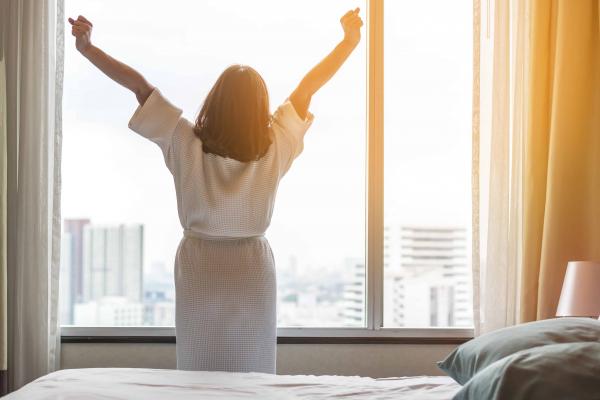
People are willing to do almost anything to get a good night's sleep. There are tips and tricks all over the internet, but did you know some of these hacks are actually making it harder for you to snooze all night long?
Here are four habits you might think are helping you sleep at night, but are actually making it harder:
1. Exercising right before bed
Many people think exercising right before bed will help wear out your muscles and make it easier to relax, but it actually does the opposite. Exercising causes your heart rate to increase, making it more difficult to calm your body down. And all your adrenaline that helps you finish up that last mile is making it hard for your body to relax enough to sleep.
Instead, try stretching before you go to bed and exercising when you first wake up in the morning. This will help wake up your muscles and get your heart rate up around breakfast and the stretching will calm your body down for bedtime.
2. Taking a hot bath or shower
There's nothing better than a hot shower or bath after a long, stressful day. But even though your muscles are relaxing, this hot soak is making it harder on yourself to fall asleep. The optimal temperature for falling asleep is between 60 to 68 degrees Fahrenheit, and soaking in hot water before going to bed will make it difficult for your body to adjust to that cooler, "perfect bedtime" temperature.
If the hot water helps relax your stressed out muscles, be sure to spend a few minutes in some cooler water to help regulate your body temperature before slipping into bed.
3. Screen time in bed
I had an old roommate who insisted she couldn't sleep unless she spent some time on her phone before going to bed. She'd lay under the covers, scrolling through social media or playing games on her screen for what was sometimes hours before she finally turned it off and went to sleep.
Some people think that spending time on their screens (whether that's watching TV in bed or scrolling through Facebook) will help their brains settle down before they fall asleep.
It's quite the opposite, however. Turns out, the blue and white lights emitted from your screen are actually suppressing the melatonin in your brain, the hormone that regulates your sleep pattern. Most sleepexperts suggest you turn off all electronic distractions 30 to 60 minutes before going to bed.
4. Going to bed at different times
I wish we could just store up hours of sleep over the weekend and use that to get us through the week. Unfortunately, this isn't the case and trying to "catch up" on sleep can actually make matters worse for you.
After a sleepless night, people will try going to bed a couple hours earlier the next day to try and catch up on their missed sleep, but that's actually harming their pattern even more. In fact, it's better to get a little less sleep and still stick to your schedule as much as possible than it is to go to bed earlier and get more sleep. The better you are at keeping your bedtimes and wake up calls the same each day, the better you will sleep, overall.
As tempting as it is, try to avoid sleeping in, too. This can completely disrupt any sleep schedule you've been trying to develop for yourself and end up with you feeling more tired.
While getting the perfect night's sleep every single day isn't always feasible, there's always something we can do to improve how rested we feel in the morning. There are several health risks that come with sleep deprivation, so be sure to cut these bad habits to improve your health and get you feeling better every day.

